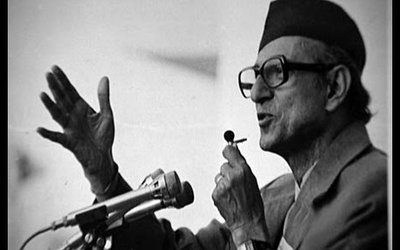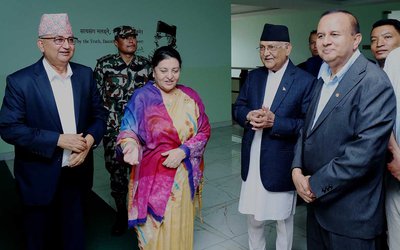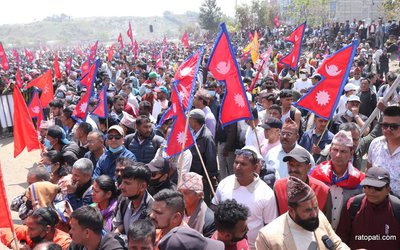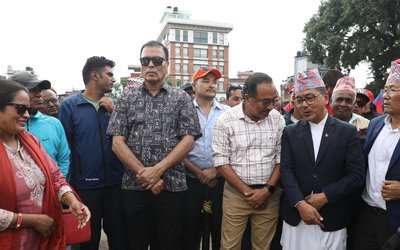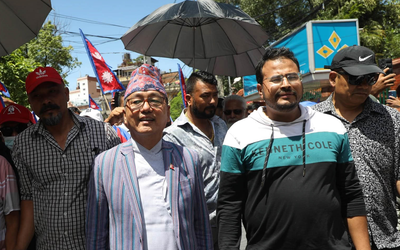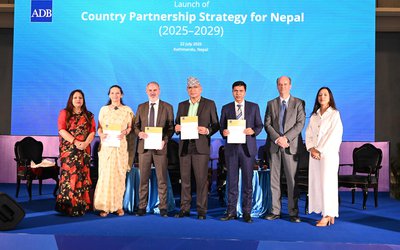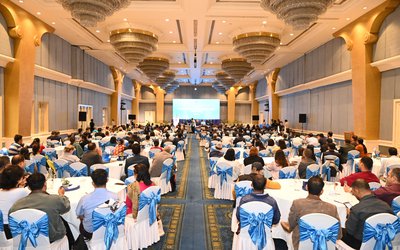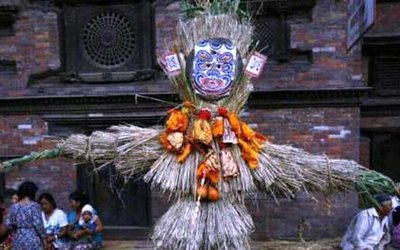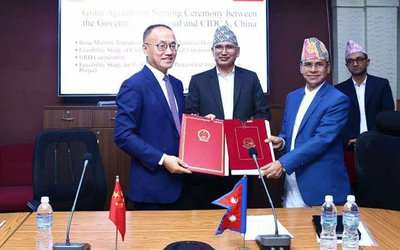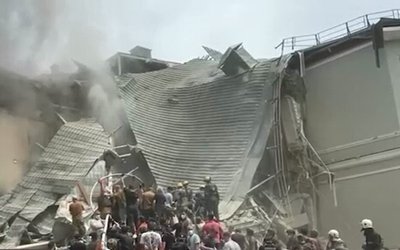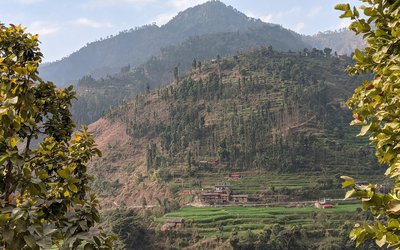
With the election of Narendra Modi, a leader of Hindu party, as the prime minister of India, there is some unease in the Nepalese political spectrum, which is under a heavy influence of the communist, mainly, Maoist ideology. The debate is whether India will continue its policy towards Nepal. Given the past experience of Nepal-India relations, it is not an ideology but national interest which has determined the type of relations between the two countries. Sandwiched between India and China, Nepal, a country facing south of Himalayas, joining India’s heartland Bihar and Utter Pradesh, remains India’s sensitive security zone. Similarly, China too considers Nepal as a soft place in relation to Tibet. As the current political ideology does not make any threat to India’s interests, the new government led by Modi will likely continue to maintain the existing relations.
“It is a natural phenomenon for the foreign policy of any society to be strongly affected by domestic political and economic factors, and this is certainly the case in Nepal. But the reverse principle-namely that international factors have a strong and often decisive impact on Kathmandu’s domestic policies-is even more apparent. This is a painful fact of life for many Nepalis, and one that some of them would prefer to ignore,” writes late Leo Rose, an American scholar in his book Nepal: Profile of a Himalayan Kingdom.
Recent comments in the Nepalese media that appeared after the Indian election results have indicated what American scholar late Leo Rose wrote in the 1980’s is relevant. Whether one likes it or not, international factors, particularly the India factors, have had decisive impacts on the domestic politics of Nepal. In its long history, India has played a decisive role in all kinds of political change in Nepal, including People’s Movement II 2006 and turning Nepal into Secular, Federal and Republic Nepal.
Despite opposition from BJP led by president Raj Nath Singh, then Indian establishment endorsed the 2006 agenda along with US and European Union. As BJP government led by Narendra Modi comes to power, both groups, proponents and opponents of 2006 changes, are hoping that Modi will do them favor.
“I don’t think India´s policy towards Nepal will be changed after the formation of new government there,” said Minister for Foreign Affairs Mahendra Bahadur Pandy. "India is our very close neighbor. Our relations are very good and this will continue in the future. So, we are confident that our relations would be further strengthened."
Even before the curtains finally came down after a very long and drawn out Indian election, the debates are taking place in Nepal about Modi’s policy and its implications in Nepal’s internal politics. The forces which want to turn Nepal as a Hindu and monarchical state is over-enthusiastic and they expect significant and positive changes to take place in Nepal-India relations.
Senior journalist Yubaraj Ghimire, however, believes generally regime change does not led to automatic shift in foreign policy of a country towards another- far or near- but because India is so much involved in Nepal’s internal politics that has brought chaos and uncertainty in Nepal in past eight years. A serious review of its Nepal policy may be in bilateral as well as Nepal’s and India’s interest.
As BJP is in power, leaders of RPP-Nepal - which is pushing the agenda of making Nepal Hindu, monarchical state, sound high. “Nepal needs to restore the Hindu state. We will burn any constitution if it does not spell Nepal as a Hindu state,” thundered RPP-Nepal chair Kamal Thapa in a meeting held recently after the results of Indian elections.
As the Bharatiya Janata Party (BJP) leader Narendra Modi is all set to assume the post as India´s new prime minister following a landslide victory in the general elections, experts in Nepal are optimistic that the ties between Nepal and India would further strengthen during his term.
Former diplomats and political observers hold the view that the majority government of BJP under Modi will prove helpful to Nepal in her development endeavors as BJP has shown its “magnanimity´ even in the past. "It can be hoped that Nepal and India would enjoy closer ties during Modi´s term as the India´s prime minister," said former ambassador of Nepal to India Bhekh Bahadur Thapa. “However, it is unlikely that the BJP government would make any substantial changes in India´s policy toward Nepal."
Former ambassador Shambhu Ram Simkhada rejected the apprehensions that BJP´s Hindu nationalism will have an impact on Nepal´s secular status. "Though the foreign policy is partly influenced by the perspectives of political leadership, I do not see any changes in India´s standing policy towards Nepal´s secular status," said former ambassador Shimkhada.
At a time when Nepal’s political spectrum is widely dominated by leftist ideologies, including Maoist, many are wondering where there can be any changes in the rise of rightist force led by Modi. UCPN-Maoist leader Dr. Baburam Bhattarai, who reportedly made a telephone conversation with Modi, told the media that Modi will continue to pursue the previous policy towards Nepal.
Although RPP-Nepal leader Kamal Thapa met Indian prime minister Modi a few months back in a campaign, UCPN-Maoist leader and former prime minister Dr. Bhattarai was the first to call the next Indian prime minister and Hindu leader Modi. This indicated that national interest always overcomes personal belief.
Jayaraj Acharya ruled out the possibility of any substantial change in India´s foreign policy toward Nepal. "There won´t be any major change in India´s foreign policy toward Nepal.”
Nepali Congress leader Ram Chandra Poudel said,"Indian National Congress's ouster from power in India will not make any serious impact on India's foreign policy."
Madhesi leader and president of Sadbnawana Party Rajendra Mahato said, he expects that "during the tenure of BJP leader Modi as the Prime Minister, the relations between Nepal and India will further deepen and expand. The relations between the two countries will be taken towards mutual benefits."
Although BJP has severely criticized India’s foreign policy, especially the neighborhood policy pursued by Dr. Manmohan Singh led government, as a failure, it is critical about Nepal policy and asserted that it will reorient it.
In its manifesto, BJP said that it will re-craft India's Nepal policy to rid it of the UPA's biases that have influenced India's response to events in Nepal with which our country shares a common civilization and cultural history. “India-Nepal relations must be based on friendship, mutual cooperation and harmony of interests. Towards this end, existing arrangements will be reviewed and revised bearing in mind mutual interests and benefits on the basis of dialogue. The BJP would like to see Nepal emerge as a stable, prosperous country, and will strive to strengthen age-old fraternal ties,” said BJP’s manifesto. "However, whenever required we will not hesitate from taking strong stand and steps."
As Modi has made it clear that he will allow state government in conducting foreign policy, the BJP government will encourage the states to play a greater role in diplomacy, actively building relations with foreign countries to harness their mutual cultural and commercial strengths.
If state governments are allowed to conduct diplomacy, Nepal- which has border with five Indian states- well need to reorient itself. However, Nepal’s leadership is yet to make up its mind on that.
Whatever the regional implications, Modi’s regional policy will depend on how India’s policy towards China will be. Given the long border disputes and existing hostility, it will take a long time to develop a workable approach. This will create difficulty for Nepal.
Economic front
Backed by India’s powerful business lobby, Modi’s booming India will be advantageous for Nepal. In case Indian businessmen and investors find Nepal’s resources can benefit Indian economy, they will definitely to come to invest in Nepal. Modi ran on his expansive promises to revive India’s “moribund economy, end corruption, create millions of jobs and lift millions of people out of poverty”.
As powerful business lobbies backed Modi’s campaigns, Nepal will have options to utilize its resources. As Nepal has a total trade deficit of Rs 556 billion, with India alone standing at Rs 450 billion, Nepal may get a better chance to lure Indian investors.
For many years, India and China had been running neck and neck in terms of their respective economic growth rates. But while China’s economic expansion is still powering ahead at a mouth-watering 7.5% a year, India’s annual growth rate has slipped to just 4.7%.
But with signs that structural changes might be looming on the horizon and foreign investments welcome in the world’s largest democracy, now might be a good time to give the Indian market a good once-over.
For a country like Nepal, it is too early to predict any changes. Much depends on what happens next in India. It hinges on the Modi government’s ability to kick start the economy and create more jobs. It also depends on whether the Modi’s administration can find a way to reorient its own policy?

Keshab Poudel
Poudel is the editor of New Spotlight Magazine.
- RASUWAGADHI FLOOD: GLOF Devastation
- Jul 20, 2025
- ERC Nepal Is Focused On Expanding Distribution And Transmission To The Private Sector: ERC Chair Dr. Dhital
- Jul 06, 2025
- FOURTH PROFESSOR Y.N. KHANAL LECTURE: Nepal-China Relations
- Jun 23, 2025
- Colonel JP CROSS: Centenary Birthday
- Jun 23, 2025
- BEEN: Retrofitted For Green
- May 28, 2025
